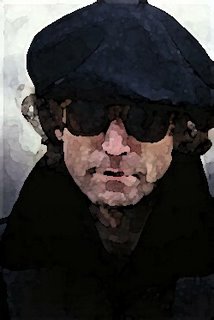
It was 25 years ago next week that John Lennon was shot to death outside his home on West 72nd Street and Central Park West in New York.
I was hundreds of miles away and heard about it from Howard Cosell, while watching the New England Patriots play on Monday Night Football and reading John's "comeback" interview in Playboy, which had just come out.
My stepmother Sandi called me as soon as she heard the news and we both cried into the phone. His death struck home for a couple of reasons.
One, because John Lennon was a boyhood idol of mine and another because I was supposed to be there, in the apartment I shared on 72nd Street, a half a block west towards Columbus Avenue. I missed my ride back to New York that Saturday night. It was probably a gig or a concert that kept me away. No matter.
Had I been there, I might have been taking my usual night walk around the block at the precise moment John and Yoko were returning from the recording studio to meet their fate. Could I have prevented it somehow if I had been there? The thought haunts me to this day.
You always met a number of the faithful fans gathered outside the Dakota to catch a glimpse of John. They were nice folks and I always chatted up whoever was there, knew many of the regulars on a first name basis, would bring them coffee from the Argos Restaurant up on the Columbus Avenue corner.
I remember one guy, a photographer named Michel from Montreal, whose pictures later showed up in one of the posthumous collections of images that appeared after Lennon’s death. He was a regular, whenever he was down from Canada, and had even managed to get some of his photographs in to John via the doorman; he showed me some of the images, mostly candid snapshots of the family taking a stroll.
John and Yoko liked to stroll around and in the Park – "It's John Lennon, I can’t believe it," he would say if he caught you recognizing him. Michel was a real fan, not like the evil-doer-who-shall-not-be-named who took John down.
John and Yoko frequented Café La Fortuna on 71st, where I used to hang out writing poems and drawing. You could see the back patio from my building. Across the hall from me was Benny Fine and his roommate Max, a doorman who used to play in The Circle (they had a hit in the Sixties with "Red Rubber Ball"). Benny used to point out the café from their window, mostly to complain about the smell of coffee waste in the garbage cans out back.
That night could have been different; John could have lingered in the neighborhood, gone around for a late night espresso. It was an opera hangout, full of old opera buffs and dancers drinking coffee and smoking Nat Sherman's who didn't care much for Lennon's music.
Nobody bothered John there, it was an unspoken rule, but sprinkled among the photographs and album covers of famous opera singers on the walls, was a fair number of signed pictures and LPs from the famous couple.
But they didn't get a coffee that night; they went straight home, John still clutching the last recordings he made.
That was "the day the music died," as the old song goes, but it was more than that for those of us to whom John was more than his music. His was an example of what one could do with art, music, and fame beyond the art: he cared. And he taught me to care.
To a boy growing up in the shadow of the Nixon, John was like a beacon of hope. He stood for things. He wasn't afraid to play the fool. He spoke out – whether you liked what he said or not – and spoke up.
In the entire hullabaloo around Bono's promotion to end poverty and AIDS, has anyone noticed that "One" is a derivative of John's "Bag One"; his efforts of the late sixties-early seventies?
John climbed in bed for peace and was ridiculed, but brought attention to his cause. He zipped himself and his bride into a bag for peace, returned his MBE for peace, planted acorns for peace, and other silly acts of caring.
Even the white of the wristbands and t-shirts used to promote the One Campaign is reminiscent of the white clothes, balloons, and "WAR IS OVER" billboards John used for his cause.
I can trace my caring to three people. Three people who shaped my ethos of caring and helped make me who I am today, who led me to do the work I do, and write what I write here on this web log and in my poetry: John Lennon, Roberto Clemente, and Gladys Taylor. (More on the other two later.)
John was an icon. He was also a fragile, insecure man – could even be an asshole, according to many reports and biographies. Nevertheless, he wasn't afraid to care. And caring is what it's all about.
IMAGINE that.
Categories: caring, ethic, activism
2 comments:
Most beautiful post, and accurate. The lesson of caring is profound. Caring transcends smarts and trumps power. John knew that and in that we join the circle he drew.
Thanks, Jack. That means a lot coming from you.
Post a Comment